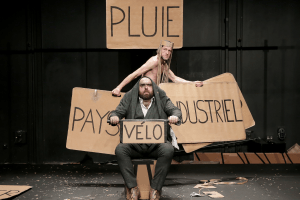England & Son at Edinburgh Festival Fringe – review
Mark Thomas returns to the Fringe with a scathing assessment of modern life

A monologue by the comedian Mark Thomas feels like an integral part of the Edinburgh Fringe, but England & Son sees him moving into darker territory.
It is a play rather than a semi-documentary observation such as his award-winning The Red Shed (about Labour and its traditions) or Check Up, a rallying cry for the NHS. And it’s written not by Thomas but by Ed Edwards, best known for The Political History of Smack and Crack, and a man who uses his own experience as a once-imprisoned drug addict to inform drama of rage and intensity about the treatment of the working class.
This new piece has a terrifying force as it charts the story of a homeless man whom we first encounter escaping from the waste bin where he has been sleeping – and then watching in horror as his best mate, sleeping there with him, is plunged into the maws of a rubbish crusher.
From this extraordinary image of lives discarded by society, the play spins backwards, piecing together a story of childhood abuse and teenage delinquency which – despite occasional attempts at support – becomes an adulthood of crime, prison, addiction, and life on the streets. The story unfolds in fragmentary snapshots, kaleidoscopic images that build a picture in shards.
The dominant image of the recollections is a brutish father-figure, tattoos on one arm, scars on the other, whose surname – England – allows the play to make metaphorical points about the skewed values of the country England has become. “England used to build things, now we just knock things down,” refers both to his transformation from builder to demolition expert, and to the general state of things.
His former career as a soldier, sugar-coating memories of his time in Malaysia and the atrocities that occurred there, enables an examination of the way that colonialism distorted a country’s vision of itself and its role, allowing it to excuse violence and appropriation.
But although that overarching structure is firmly in place, it is in its depiction of the distorting effects of an abusive childhood in snuffing out hope and promise that the play most strongly hits home. Cressida Brown’s powerful direction, and the effects of Richard Williamson’s lighting and Michael John McCarthy’s sound design add to the mounting sense of panic as Thomas recounts incident after incident that turned him into the man he is.
The piece was written specifically for Thomas and it plays on his exceptional ability as a spinner of yarns, someone who can hold the audience in the palm of his hand as the tone veers from comic – the benefits of a study of Miller’s Antique Handbook and Price Guide for a would-be burglar – to tragic as he recounts the time his father locked him in a garage. His energy and his extraordinary feeling – the way sadness, amusement, despair all seem to funnel through him – powers the piece.
The play’s observations – a kind social worker’s description of artisan as “posh people doing working class things, charging more money and doing a really bad job”, for example – are fierce and sharp; its empathy, profound and moving. A triumph for all concerned.
















